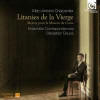Texte paru dans: / Appeared in:
*

International Record Review - (10//2013)
Pour
s'abonner / Subscription information
Harmonia Mundi
HMC 902169

3149020216927 (ID329)
Consultez toutes les évaluations recensées pour ce cd
~~~~ Reach all the evaluations located for this CD
French Catholicism under Louis XIV was anything but a tranquil affair. Rather it was beset by devotional, theological, institutional, philosophical and ecclesiological feuds of some ferocity and often numbing complexity. The greatest French composer of that era, Marc- Antoine Charpentier, cannot have been completely immune from these ructions: he was too close to the Jesuit order and the noble family of Guise, who were both, to differing degrees, protagonists in them. Yet his huge corpus of surviving sacred music (preserved for us by a dutiful nephew) radiates unruffled religious faith and optimism.
The vocal works as performed on this CD are drawn from the six-part motets written for the fine musical establishment maintained by his patroness, the Duchesse de Guise. Catherine Cessac, doyenne of Charpentier scholars, tells us in her booklet essay that he lived in the Hôtel de Guise for nearly 20 years as composer-in-residence and singer. As a member of the Lorraine family, suspected of treasonous intent by Richelieu, the Duchess had spent many years in exile in Florence where she acquired a strong taste for Italian sacred music, particularly oratorios. By the time she recruited Charpentier into her household, she had long been back in France, but the fact that the young composer had just returned from studies in Rome with Carissimi would obviously have impressed her. Throughout his career, Charpentier took the bristling energy and melodic creativity of mid-century Italian music and gave it a thoroughly French sense of grace and gravitas.
Born on the Feast of the Assumption (August 15th), the Duchess was deeply devoted to the Blessed Virgin, as it seems was Charpentier himself. Alongside the biblical text of the Miserere we find on this disc two lengthy compositions on Marian themes: a Litany (one of several Charpentier settings) and a motet, Annuntiate superi, with a text of such exultant Mariology that St Louis de Montfort himself would have approved. The scores survive in the composer’s own hand and we know the names of most of the performers. He marked his own haute-contre (high tenor) part ‘moy ici’. The high-voices parts were sung by women, not by boys as would have been more common at the time. The instrumental accompaniment is modest in size — two treble instruments plus continuo — but not in inspiration.
Consistent with Charpentier’s own practice, Ensemble Correspondances shares the treble parts between violins and recorders. The bass part is played on a basse de violon, a viola da gamba and theorbo plus organ or harpsichord. Supplementing the three motets are two ravishing ensemble pieces, which make one wish Charpentier had written much more purely instrumental music than he did. Ensemble Correspondances instrumentalists here, and throughout the recital, play with exquisite grace and charm. The violin tone is particularly bewitching.
The ensemble’s director, Sébastien Daucé, notes that Charpentier actually used eight singers to perform his six-part Guise motets, which allows a greater variety of vocal timbres and sizes of ensemble to be employed. For example, sometimes the bass part is sung by a baritone (basse-taille), other times by a true bass, again at other times by both. Each of Daucé’s singers sings a deal of solo or near solo music and each is well up to the challenge. It is rare indeed to hear a vocal ensemble perform the French motet repertory where not a single voice causes concern (wobbly sopranos and straining haute-contres are the normal offenders). Each voice has a lovely timbre and each singer a confident grasp of Charpentier’s idiom. Daucé emphasizes the soft, the lyrical and the mystical over the dramatic elements in this music.
I have long treasured Jordi Savall’s all-star recording of Marian music by Charpentier on Naïve, which includes the same litany as on this disc and a different setting of Annuntiate superi. Where Savall’s forces perform with crackling exuberance, Les Correspondances takes a slower, quieter and more ‘interior’ approach. Initially, I thought it was a bit muted, but return listening won me over to Daucé’s calm and measured account. All three motets breathe the same air of strong but understated devotion. It is really impressive and profoundly beautiful. Despite what appears to be a modern studio recording, the ambience is very evocative of how one imagines a small spiritual concert at the Hôtel de Guise might have sounded.
For decades now, Harmonia Mundi has served very well the
music of one of France’s greatest composers. This luminous recording by
Ensemble Correspondances adds considerably to that proud record of
achievement.
Fermer la fenêtre/Close window
Cliquez l'un ou l'autre
bouton pour découvrir bien d'autres critiques de CD
Click either button for many other reviews


